Introduction
What Do Rabbits Need In Their Cage: Rabbits are delightful and popular pets, cherished for their gentle demeanor and adorable appearance. However, providing them with a suitable living environment is crucial to ensure their well-being and happiness. One of the fundamental aspects of rabbit care is creating an appropriate cage or hutch for them. In this guide, we will explore the essential elements that rabbits need in their cage to thrive, from comfortable bedding to proper nutrition and everything in between. Understanding and implementing these key components will help ensure that your furry friend lives a healthy and contented life in captivity. So, let’s delve into the essentials of what rabbits need in their cage to keep them hopping with joy.
Rabbits are active animals that require ample space to move around. The cage or hutch should be spacious enough for them to hop, stretch, and stand up on their hind legs without restrictions. A general rule of thumb is to provide at least four square feet of space per rabbit. Choose appropriate bedding material such as hay, straw, or wood shavings to line the cage floor. This not only provides comfort but also absorbs moisture and helps control odors. Make sure to keep the bedding clean and dry. Rabbits cage need a place to retreat and feel secure. Provide them with a hiding spot or shelter inside the cage where they can rest and escape from potential stressors.
Rabbits are naturally inclined to use a designated area as a toilet. Place a litter box with rabbit-safe litter in one corner of the cage to encourage litter training.Access to clean, fresh water is crucial for rabbits. Use a drip-feed water bottle or a heavy, non-tip bowl to ensure they always have access to hydration.A balanced diet is essential for rabbit health. Feed them a combination of fresh hay, high-quality rabbit pellets, and fresh vegetables. Avoid feeding them foods that are high in sugar or starch, as these can lead to digestive issues.Rabbits are intelligent and need mental stimulation. Provide them with toys like tunnels, chew toys, and puzzle feeders to keep them entertained and prevent boredom.
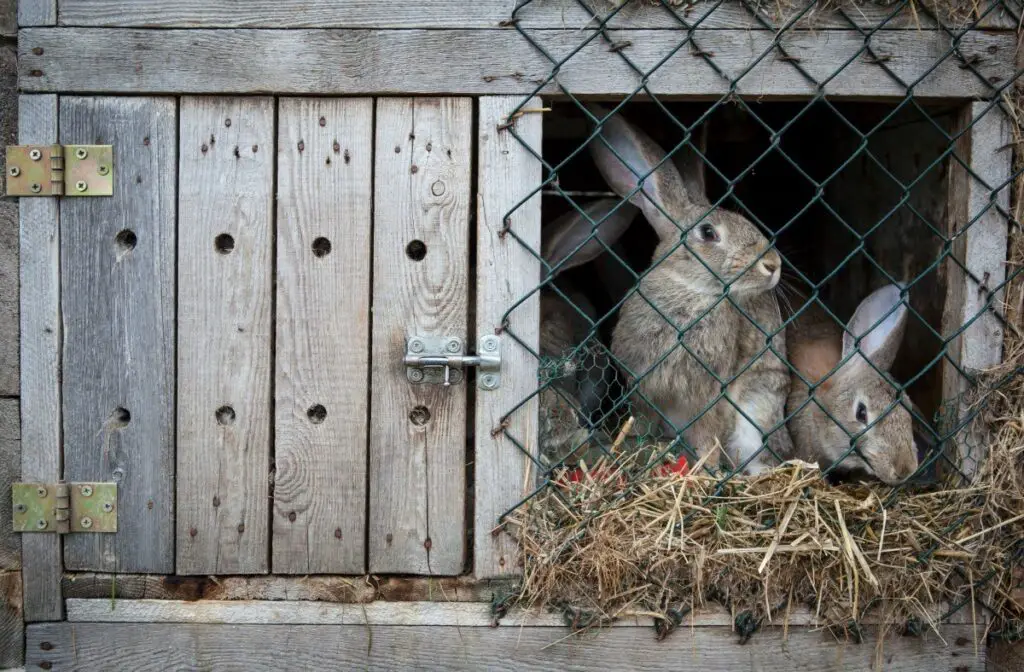
Do bunnies need a bed in their cage?
For indoor pet rabbits, bedding is not necessary to include in your rabbit’s habitat as long as your rabbit has access to soft flooring. Outdoor rabbits will require bedding for insulation to help them stay warm in the night and during the cold months of the year.
Natural Behavior and Preferences
Rabbits are crepuscular animals, which means they are most active during dawn and dusk. In the wild, they spend a significant part of their day burrowing and digging, creating a comfortable nest for themselves. Domesticated rabbits have retained these instincts, and they appreciate having a soft and cozy spot to rest in their enclosure. Providing a bed or a designated resting area can cater to their natural behavior and preferences.
Bedding Options
There are various bedding options to consider for your bunny’s cage:
Straw: Straw can provide a warm and comfortable surface for your rabbit to rest on. It’s also safe for them to nibble on, although some bunnies may not find it as cozy as other options.
Hay: High-quality hay can serve as both bedding and food for rabbits. It offers a comfortable surface for them to rest on and encourages natural foraging behavior.
Fleece or Blankets: Soft fleece blankets or towels can create a comfortable bed-like area for your rabbit. Ensure they are washed regularly to maintain cleanliness.
Bedding Mats: There are specialized bedding mats designed for rabbits and other small animals. These mats are comfortable and easy to clean.
Cage Size and Layout
The size and layout of your bunny’s cage play a crucial role in determining whether a bed is necessary. A spacious cage with multiple levels and hiding spots allows your rabbit to choose where they want to rest. Providing tunnels, hideaways, and shelves can serve as natural resting spots, reducing the need for a separate bed.
Health Considerations
Some rabbits may have specific health issues that make providing a bed important. Elderly or arthritic bunnies may benefit from a soft and cushioned surface to alleviate pressure on their joints. However, it’s essential to consult with a veterinarian for guidance on your individual rabbit’s needs.
What are 4 things rabbits need to survive?
In general rabbits need appropriate housing, exercise, socialisation and a specific diet for good welfare. Some breeds of rabbits, particularly the longer haired rabbits, may require daily grooming. It is important that you understand all the requirements for caring for a rabbit before you buy one.
Proper Nutrition
One of the primary needs of rabbits is a balanced and nutritious diet. Rabbits are herbivores, which means their diet primarily consists of plant materials. Here are some key dietary considerations:
Hay: High-quality grass hay, such as timothy hay, should make up the majority of a rabbit’s diet. Hay provides essential fiber, aids in digestion, and helps keep their teeth worn down.
Fresh Vegetables: Rabbits should have a variety of fresh vegetables daily, including leafy greens like kale, romaine lettuce, and parsley. These vegetables provide vitamins and nutrients.
Pellets: Commercial rabbit pellets can be part of their diet but should be given in moderation. Look for high-fiber, premium-quality pellets without added sugars.
Water: Clean, fresh water should always be available to your rabbit. Ensure they have access to a water source that is changed daily.
Safe and Comfortable Shelter
Rabbits need a secure and comfortable shelter to protect them from the elements and potential predators. A proper shelter includes:
Housing: A suitable hutch or cage that is large enough for the rabbit to move around, stand up on their hind legs, and stretch out comfortably.
Protection: The shelter should be kept in a safe area, away from extreme temperatures, direct sunlight, and drafts. It should also be predator-proof to keep your rabbit safe.
Bedding: Provide soft bedding materials such as straw or hay for comfort and warmth.
Exercise and Enrichment
Rabbits are active animals that need mental and physical stimulation to thrive. To fulfill this need:
Space: Give your rabbit plenty of space to hop, run, and play. Consider rabbit-proofing a room in your home or providing a secure outdoor playpen.
Toys: Offer a variety of toys and objects to chew on to keep their teeth healthy and satisfy their natural urge to chew.
Social Interaction: Rabbits are social animals that benefit from companionship. Consider adopting a bonded pair if possible, or spend quality time with your rabbit to provide social interaction.
What do indoor rabbits need?
Rabbits will need a large, safe enclosure in a quiet part of your home. This enclosure must include a main shelter and a large, secure exercise area, with additional hiding places.
A Safe and Comfortable Living Space
Creating a safe and comfortable living space is paramount for indoor rabbits:
Cage or Enclosure: While rabbits should have ample time outside of their enclosure for exercise, they still need a secure and appropriately sized cage or pen. The enclosure should be spacious enough for the rabbit to move around, stretch out, and stand on its hind legs. Wire flooring should be avoided to prevent foot problems, and a solid bottom with soft bedding is ideal.
Bedding: Provide comfortable bedding, such as straw, hay, or recycled paper bedding, to keep your rabbit cozy and to absorb waste.
Litter Box: Rabbits can be litter trained, so providing a litter box in a designated area of their enclosure is essential. Use rabbit-safe litter material, such as paper-based or wood pellets.
Proper Nutrition
A balanced diet is crucial for the health of indoor rabbits:
Hay: High-quality grass hay, such as timothy hay or orchard grass hay, should make up the majority of their diet. Hay is essential for digestion, dental health, and provides necessary fiber.
Fresh Vegetables: Offer a variety of fresh vegetables daily, including leafy greens like kale, spinach, and cilantro. These vegetables provide vitamins and nutrients.
Limited Pellets: Commercial rabbit pellets should be given in moderation, as they can be high in calories. Look for high-fiber, quality pellets without added sugars.
Fresh Water: Ensure your rabbit has access to clean, fresh water at all times.
Environmental Enrichment
Indoor rabbits need mental and physical stimulation:
Toys: Provide a variety of toys and objects for your rabbit to chew on and play with, such as wooden blocks, cardboard boxes, and safe plastic toys.
Tunnels and Hideaways: Rabbits enjoy exploring and having places to hide. Offer tunnels and hiding spots within their living space.
Social Interaction: Rabbits are social animals and benefit from companionship. Consider adopting a bonded pair or spending quality time with your rabbit to provide social interaction.
What veggies can rabbits eat daily?
“Carrots should be fed sparingly, as they are very high in carbohydrate and may upset GI bacterial flora.” Particularly good vegetables include the dark leafy greens like romaine lettuce, bok choy, mustard greens, carrot tops, cilantro, watercress, basil, kohlrabi, beet greens, broccoli greens, and cilantro.
Carrots and Carrot Tops
Carrots are a popular treat for rabbits, but they should be given in moderation due to their sugar content. However, carrot tops (the leafy greens) can be offered daily as they are lower in sugar and provide essential nutrients.
Bell Peppers
Bell peppers are a good source of vitamin C and can be a tasty and nutritious addition to your rabbit’s daily vegetable selection. Both red and green peppers are suitable.
Cucumber
Cucumber is a hydrating vegetable that rabbits generally enjoy. It’s a low-calorie option and can be offered daily.
Zucchini
Zucchini is a nutritious vegetable that is low in calories and a good source of fiber. It can be a part of your rabbit’s daily diet.
Celery
Celery can add some crunch to your rabbit’s meals. It’s low in calories and provides hydration.
Chicory
Chicory is a leafy green that is high in fiber and a good source of vitamins.
Dandelion Greens
Dandelion greens are not only safe but can be a beneficial addition to your rabbit’s diet. They are high in fiber and various vitamins.
Do rabbits need blankets at night?
Rabbits enjoy sleeping on soft and comfortable materials. Consider providing your bunnies with pillows and blankets. Some animals may require extra bedding cover during winter. However, avoid providing your rabbits with too many blankets and pillows because the bunnies can quickly overheat.
Natural Adaptations
Rabbits have a built-in protection against the cold, which is their thick fur. Their fur acts as insulation, helping them regulate their body temperature. In the wild, rabbits burrow underground to escape extreme temperatures and predators, taking advantage of the insulating properties of the earth.
Indoor vs. Outdoor Rabbits
The need for blankets varies depending on whether your rabbit lives indoors or outdoors:
Indoor Rabbits: If your rabbit is kept in a climate-controlled environment, blankets are generally unnecessary. Most indoor settings maintain a stable and comfortable temperature that is suitable for rabbits. However, rabbits do enjoy soft and cozy surfaces, so providing a comfortable bedding material within their enclosure can be a good idea.
Outdoor Rabbits: Outdoor rabbits are more exposed to temperature fluctuations and harsh weather conditions. In colder climates, providing proper insulation in the form of blankets, straw, or specialized hutch covers can be crucial to help them stay warm and comfortable.
Temperature Considerations
When considering whether to provide blankets at night, it’s essential to take the temperature of the rabbit’s environment into account:
Cold Weather: In cold weather, especially if temperatures drop significantly during the night, providing blankets or extra bedding can help insulate your rabbit’s living area and keep them warm. Ensure that the blankets are dry and clean to prevent any health issues.
Moderate Climate: In moderate climates where temperatures remain relatively stable, rabbits may not need blankets at night as long as they have a comfortable and insulated enclosure.
Hot Weather: In hot weather, providing blankets can actually be detrimental, as it can cause overheating. Rabbits are more sensitive to heat than cold. Ensure they have access to shade and ventilation in hot weather.
Rabbit Comfort
Ultimately, the decision to provide blankets at night should be based on your individual rabbit’s comfort. Some rabbits may enjoy snuggling under a soft blanket, while others may prefer to rest on a cool, solid surface. Observe your rabbit’s behavior and preferences to determine whether they seem more comfortable with or without blankets.
Is rabbit lucky for home?
According to legends, keeping a rabbit at home Vastu promotes purity and good fortune. Additionally, by removing bad energy from the home, the communication of positive energy is increased, if you keep a rabbit. The rabbit is seen as a symbol of pleasure and success in Vastu as well.
Cultural Beliefs and Symbolism
Folklore and Traditions: The idea of rabbits as bringers of luck can be traced back to folklore and cultural traditions. In some cultures, rabbits are believed to possess magical or protective qualities. For example, in Celtic folklore, the rabbit was associated with the moon and considered a symbol of protection and fertility.
Easter Bunny: The Easter Bunny, a well-known symbol in Western cultures, is believed to bring gifts and hide eggs for children on Easter Sunday. This tradition has contributed to the idea of rabbits as symbols of good fortune and abundance.
Chinese Zodiac: In the Chinese Zodiac, the Year of the Rabbit is associated with qualities such as gentleness, compassion, and good luck. People born in this year are believed to have a special connection to these positive attributes.
Practical Considerations for Rabbit Ownership
Responsibility: While rabbits may be considered lucky symbols, it’s important to remember that owning a pet rabbit comes with responsibilities. Rabbits require proper care, including a suitable living environment, a balanced diet, regular veterinary check-ups, and social interaction.
Pet Rabbits: Many people choose to keep rabbits as pets due to their gentle and affectionate nature. Pet rabbits can bring joy and companionship to a household, but they should not be acquired solely for superstitious reasons.
Rescue and Adoption: If you are considering bringing a rabbit into your home, consider adopting from a rescue organization or animal shelter. This provides a loving home to a rabbit in need and is a responsible way to welcome a rabbit into your life.
Rabbits in Home Decor
Lucky Charms: In some cultures, rabbit-themed decor items, such as figurines or paintings, are believed to bring good luck and positive energy to a home. These items can be incorporated into home decor for symbolic purposes.
Personal Beliefs: The significance of rabbits as symbols of luck can vary from person to person. Some individuals may choose to surround themselves with rabbit-themed decor to embrace these positive associations.
Is rabbit lucky for home?
According to legends, keeping a rabbit at home Vastu promotes purity and good fortune. Additionally, by removing bad energy from the home, the communication of positive energy is increased, if you keep a rabbit. The rabbit is seen as a symbol of pleasure and success in Vastu as well.
Chinese Zodiac and the Year of the Rabbit
In Chinese astrology, the rabbit is one of the twelve animal signs of the Chinese zodiac. The Year of the Rabbit is associated with qualities like gentleness, good manners, and good luck. People born in this year are believed to inherit these traits, making them considerate and fortunate. It’s common for individuals to seek out such auspicious years for important life events like marriage or the birth of a child.
Fertility and Abundance
Rabbits are known for their prolific breeding, with a reputation for multiplying rapidly. This characteristic has led to associations with fertility and abundance in various cultures. In some traditions, having a rabbit-themed decoration or figurine in the home is thought to bring fertility and an abundance of good luck.
Easter Bunny and Symbolism
In Western culture, the Easter Bunny has become an iconic symbol of Easter. The Easter Bunny is believed to bring eggs and gifts to children on Easter Sunday. Eggs, symbolizing new life, are hidden by the Easter Bunny for children to find, adding to the association of rabbits with good fortune and the joy of discovery.
Can rabbits drink out of a bowl?
Bowls are better than bottles as lapping from a bowl is more natural to rabbits. The spout of bottles can easily get clogged, and will freeze in winter if your rabbit lives outside. Bowls will not get blocked, but they may get spilled or knocked over so it’s a good idea to provide a bowl and a bottle if you can.
Rabbit Preference and Adaptation
Whether your rabbit prefers a bowl or a bottle may depend on their individual preference and past experiences. Young rabbits are often more adaptable to using water bottles if introduced to them early. However, some rabbits may never adjust to bottles and may prefer bowls throughout their lives.
Ensuring Hydration
Regardless of the method you choose, it’s essential to monitor your rabbit’s water consumption and ensure they are drinking enough to stay properly hydrated. Signs of dehydration in rabbits include lethargy, sunken eyes, dry skin, and reduced urine output.
Cleaning and Maintenance
Regularly clean and refill your rabbit’s water container, whether it’s a bowl or a bottle. Use mild soap and rinse thoroughly to prevent the buildup of algae or bacteria. Replace the water daily to ensure it remains fresh and palatable.
Temperature Considerations
During hot weather, rabbits may need more water to stay cool. Make sure to check their water supply frequently and provide additional water if needed.
Special Circumstances
Some rabbits with dental issues or physical limitations may find it easier to drink from a bowl. In such cases, a bowl may be a more suitable option to ensure they stay properly hydrated.

Conclusion
Providing rabbits with a suitable cage or hutch is essential for their well-being and happiness as pets. Ensuring they have adequate space, comfortable bedding, a secure hiding place, and access to fresh water and a balanced diet are fundamental aspects of rabbit care. Additionally, offering toys and opportunities for social interaction, regular grooming, and maintaining a clean living environment contribute to a rabbit’s overall health and contentment.
Understanding and addressing these needs not only promotes the physical health of your rabbit but also nurtures their mental and emotional well-being. Remember that each rabbit is unique, so it’s important to tailor their living space and care routines to their specific preferences and requirements. By providing a loving and attentive environment, you can ensure that your furry friend thrives and leads a happy life in their cage or hutch.

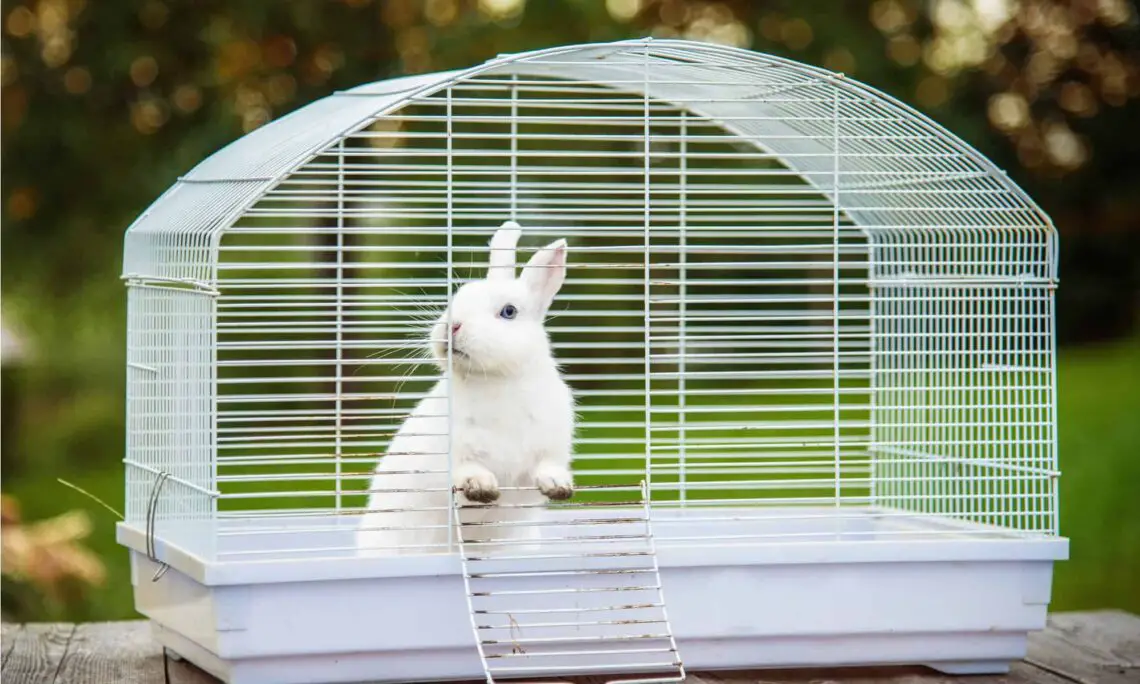
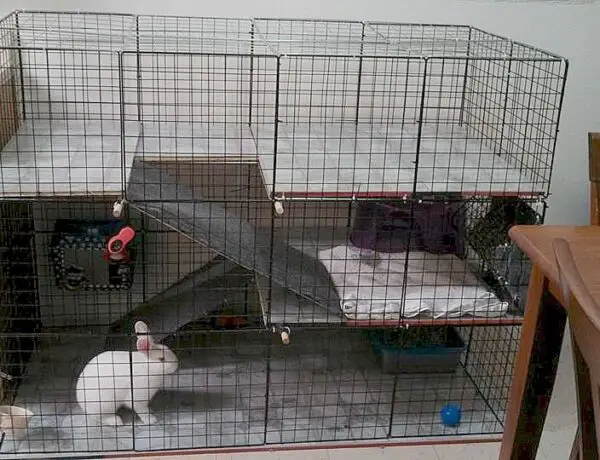
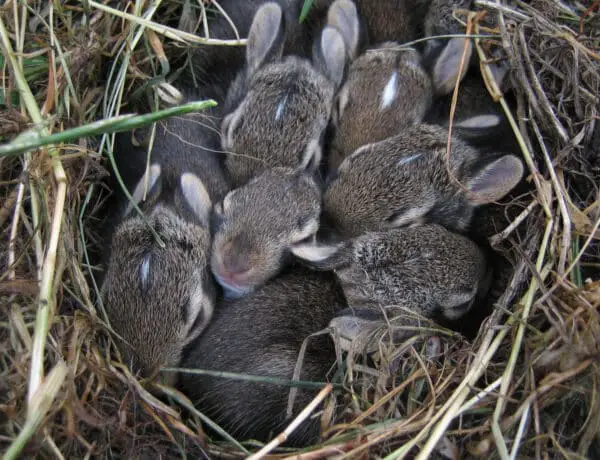
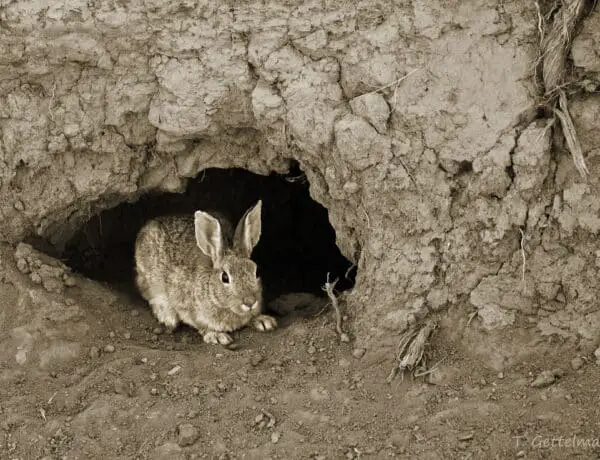
No Comments